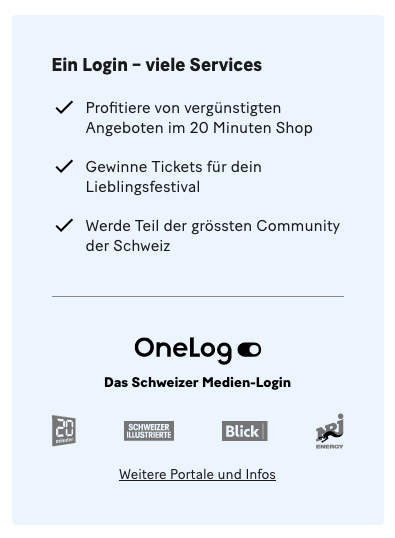
It started on a fancy boat. Three years ago, media executives from Switzerland’s largest media companies were gathered on a lake for an annual conversation about the news industry. They were worried about the looming battles over third-party cookies and losing ground in the advertising market. They wanted to find ways to work together to regain a direct relationship with their readers and news consumers online.
By the time they got on dry land, plans for what became the Swiss Digital Alliance — including TX Group, CH Media, NZZ, Ringier, and public broadcaster SRG — had been set in motion.
Some of their news sites are free, others require a paid subscription. Most had their eyes on better data in order to sell digital advertising, but others — the public broadcasters in the group — were barred from that revenue stream.The founding media partners all agreed, however, that having more first-party data and increasing the share of registered visitors would allow them to build better relationships with readers and more relevant news products. Their collective first step has been OneLog, a single sign-on system being used across a variety of news sites owned by Swiss Digital Alliance members TX Group and Ringier.

Each partner decides how often — and on what types of content — to ask users to login, noted Tamedia chief product officer Christoph Zimmer.
“The differences are quite substantial. For media with a subscription model, a login usually leads to a trial subscription, so that’s a pretty straightforward incentive,” Zimmer said. “However, there are also media with a free offer that make certain content accessible only to logged-in users, such as user comments, raffles or even specific types of articles. The common idea is to convince users to log in. How this is done depends on the positioning of the brand.”
OneLog has nearly a million active accounts and readers can already use the same sign-in system to log into more than a dozen news sites — including ones among the most widely read and trusted in the country, like 20 Minuten, Blick, and Le Matin.
When TX Group — which owns the Zurich-based national newspaper Tages-Anzeiger and boasts the most paid subscriptions in Switzerland — completes the transition to the shared login system in early 2022, the number of active OneLog accounts will grow to 2 million. (In a country with around 8.7 million inhabitants, that total represents nearly a quarter of the population.) OneLog expects that the popular public broadcaster SRG, a Swiss Digital Alliance founding member, will also adopt the log-in next year and the group is working to bring smaller, more local publishers on board, too.
Being able to use the same login for, say, The New York Times and The Washington Post and NPR and your local news site would be nice, right? The Swiss Digital Alliance hopes the lack of friction will prompt readers to log in even if a news site has no paywall. Even before implementing the single sign-on technology, the media companies launched a campaign telling readers how the move would benefit them and the news organizations they rely on.
“The first phase has been to let users know it’s important for us to know them and that they can help us and support us by logging in,” Zimmer said. “For brands such as Facebook or Netflix, it’s very clear you need to be logged in; it’s useless otherwise. But looking at media brands, it’s something that’s relatively recent.”
Chief operating officer of Ringier AG’s Global Media Unit, Patrick Rademacher, echoed the comparison.
“I have never heard a single person complaining [about] having to register for Netflix. The big difference is that for Netflix, it has never been another way, right?” Rademacher said. “We have the challenge that we have to tell our users, why does this change and why do we ask for registration now for something that has been without registration before.”
Adopting the login technology across multiple publishers and titles has been accomplished, somewhat surprisingly, without much incident, according to Zimmer and Rademacher.
“In our newsrooms, they said there’s going to be a huge shitstorm because users don’t like to register. If you mention the word login, there’s going to be a shitstorm,” Rademacher said. “Nothing like that happened. It all went very smoothly.”
To make the process even easier for readers, OneLog can accept fingerprints as easily as a password. Apple products, which already enjoy a high market share in Switzerland, are particularly well-loved by Swiss news subscribers, Zimmer noted, so it’s been important for OneLog to incorporate Face and Touch ID. (The team at OneLog — which does not collect behavioral data itself or share it between the media partners — says it’s “in frequent contact” with data protection authorities.) The media companies will continue to offer third-party logins, through Google and Facebook, though they note the percentage of users who opt to login that way remains in the single digits.
The collaboration between competitors has been made both easier and more difficult given the unique media environment. The Swiss media industry is fragmented along three major languages. Out of 8.7 million inhabitants, roughly 6 million live in the German-speaking part of Switzerland, another 2 million in French-speaking areas, and the rest mainly in Italian-speaking ones. (Romansch, one of the four official languages of Switzerland, is spoken by less than 1% of the total population.)
“[Having] different language regions doesn’t facilitate things, but the Swiss media industry wants to work together where we are not in competition,” Rademacher noted. “I think the basic principle of the industry is that we would like to collaborate in fields where we are not competitors, but we all have the costs to — for example — to build a technological infrastructure.”
Zimmer noted that though language barriers exist, the share that big media companies hold in Switzerland is large, compared to markets like Germany or France. That means, among other things, that fewer people had to put their heads together on that boat and agree.
An alliance, even one limited to tackling common challenges like the share of registered users, is rare among competing media organization. Portugal’s top publishers have been working on Nonio and Norway has seen success with a universal login system called aID.In Switzerland, strong support from the top for the alliance and OneLog has helped.
“Something that happens very often is that [companies] say, ‘Let’s do something together!’ and at the first crossroad, when you have a decision to make, say, ‘No, we can’t do that,'” Rademacher said. “To have this CEO commitment from the beginning was very important.”
Knowing news consumers is key to the media industry’s shot at competing with digital and social media companies, Zimmer said. The Swiss Digital Alliance emerged from a realization that the challenges held in common outweighed their status as competitors in some cases.
“Sometimes I have the impression that is easier for media companies to team up with Facebook or Google or any other of these international tech companies because there you have an established framework and between media companies, there’s always a lot of historical baggage and sensitivities,” Zimmer said. “From a bird’s eye perspective, I think it’s really clear that it makes a lot of sense to team up and work together because we share many interests and we share the same challenges. Of course, we’re also competitors but in many areas we’re much less competitors than we think.”